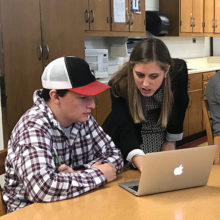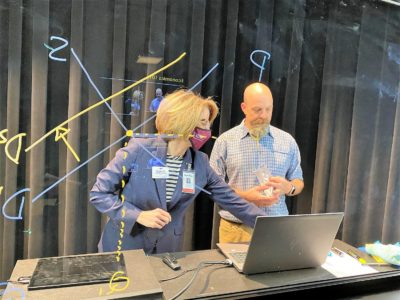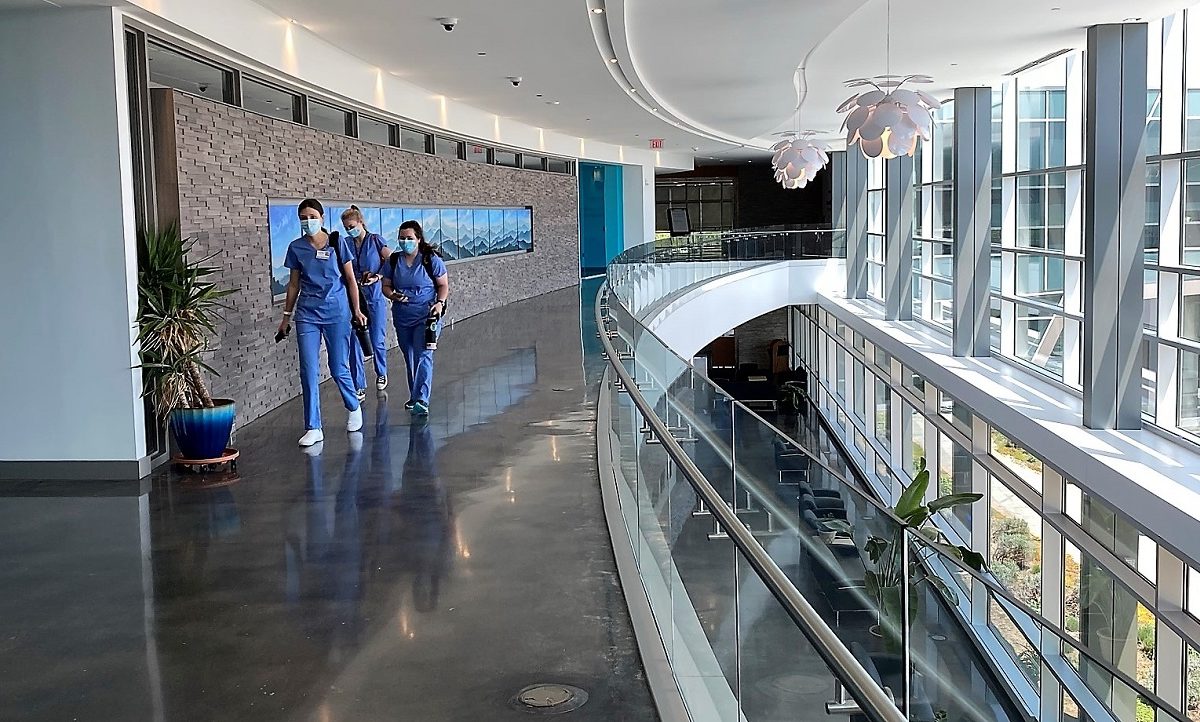
|
|
This is the first in a five-part series on adult learners at North Carolina’s community colleges. Click here to read the rest of the series.
Often when people hear the words “college student,” they think of 18- to 22-year-olds attending school full-time.
That is not the case, however, at North Carolina’s community colleges. In 2020-21, students ages 25-64 made up 52% of community colleges’ total enrollment systemwide.
North Carolina’s community colleges have a long history of educating students of all ages, from high school students taking college classes to retirees picking up a new hobby. Recently, however, colleges have begun focusing on recruiting a specific group of students: adult learners.
Adult learners, categorized as students over the age of 25, enter college with complex needs and differing backgrounds and goals. Often they are parents, work full- or part-time jobs, and carry with them added responsibilities that many younger students do not.
This summer, the John M Belk Endowment, myFutureNC, and the Belk Center for Community College Leadership and Research announced a pilot project and outreach campaign, called NC Reconnect, with five North Carolina community colleges to attract adult learners to enroll in community college this fall. The five colleges engaged in the pilot project are Blue Ridge Community College, Durham Technical Community College, Fayetteville Technical Community College, Pitt Community College, and Vance-Granville Community College.
The case for engaging adult learners
Why are community colleges focusing on these students now?
Demographics is one reason.
“Following the Great Recession, there was a major decline in the number of children being born and a decline in immigration,” said Dr. Rebecca Tippett, director of Carolina Demography at the Carolina Population Center at UNC-Chapel Hill.
Fewer babies being born and a decline in immigration might mean fewer students enrolling in college, but that doesn’t necessarily have to be the case. North Carolina’s high school graduation rate has increased significantly in the past decade. However, we’re no longer in a continuous growth phase in high school graduation rates, Tippett said.
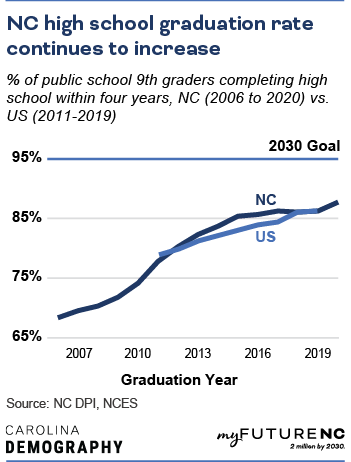
“You can’t just count on increasing numbers of 18-20 year-olds,” she said. “In some cases, you need to replace those students with other groups.”
Another reason colleges are increasingly focusing on this group of students, Tippett said, is that there is a significant number of adults who have enrolled in college before but have no degree.
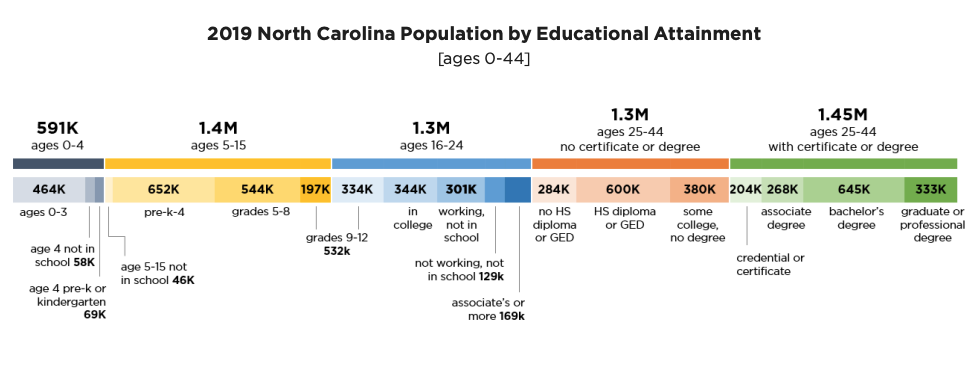
“They have shown through past schooling they are interested in getting a postsecondary degree or credential, but for whatever reason — finance, family, grades, health — were not able to complete,” she said. “So there’s a large pool of people who could come back, and, in a relatively short time period, be moved from some credit to earning a degree or credential. That has tremendous benefits to those individuals as well as employers and the economy.”
Mike Krause, former executive director of the Tennessee Higher Education Commission, said employers’ demand for a skilled workforce is a third reason colleges need to focus on adult learners.
“Our community college and technical college partners are already there, but even in the university space, we’re going to face continuing requests from the workforce sector that hey, we need these specifically trained people to do these specific things. The reality is, a lot of that is going to come from adult learners that need to retrain,” Krause said.
“There’s no way you’re going to be able to build the workforce pipeline that’s being asked of you with just traditional students. It’s not mathematically possible.”
– Mike Krause
If colleges don’t adapt, Krause said, employers will start their own colleges, “and then we have an existential threat to a lot of institutions’ business and their ability to remain open.”
The pandemic only increased the urgency for community colleges to re-engage adult learners. Many adults who lost or decided to change jobs as a result of the pandemic will need to be retrained, and community colleges can fill that need.
Meet the adult learner
So, who are adult learners?
EdNC, along with the Belk Center for Community College Leadership and Research, met with 11 adult learners at four of the five pilot community colleges.
While no two adult learners are alike, many share similar experiences and challenges when it comes to meeting their educational goals.
Here are their stories.
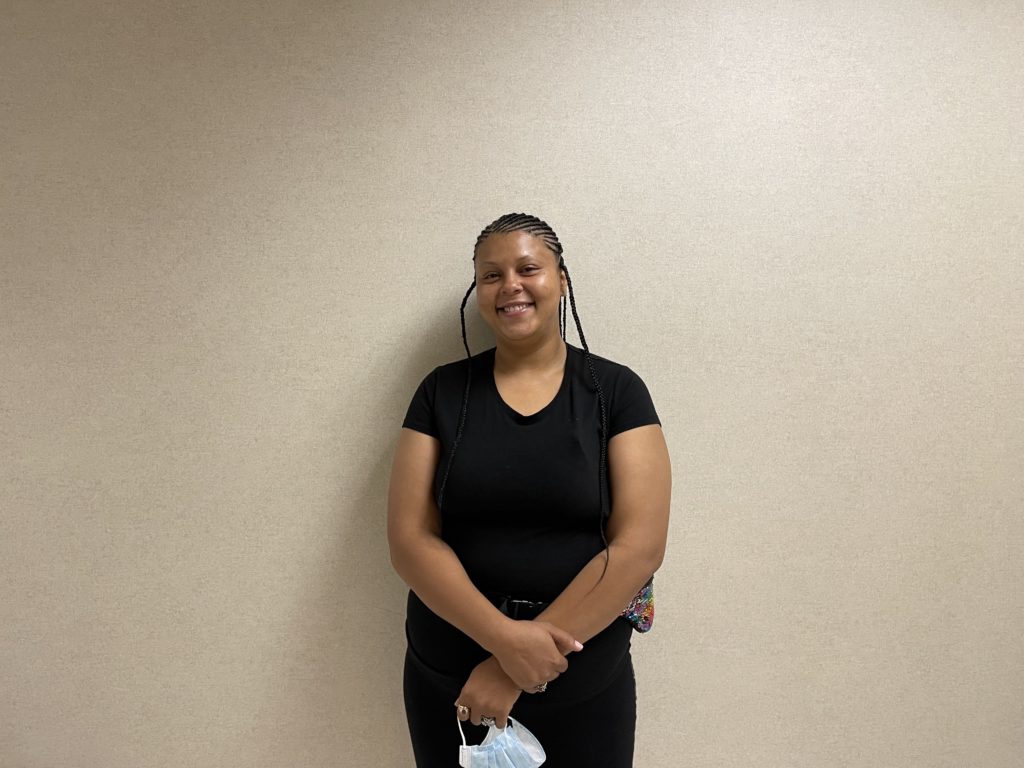
Kasi Huaman
“To cancel the poor curse.”
That’s how Kasi Huaman responded when asked about her decision to attend Fayetteville Technical Community College.
Huaman is 26 and has a three-year-old son.
“I grew up poor, so poor,” Huaman said. “I want to change that. I want to give my son what I didn’t have.”
Taking classes is a stepping stone to building generational wealth for Huaman and her family, she said.
Enrolled in the basic building construction training program, Huaman is learning a variety of skills in the construction trades. From plumbing to HVAC to forklift training and welding, students in Huaman’s program are introduced to the knowledge and technical skills that can lead to employment opportunities.
“I feel like this is a big opportunity for me,” Huaman said. She wants to be her own boss one day and pass something down to her son.
For Huaman, attending these classes has not been without challenges. During our interview, a classmate told us that Huaman’s car recently died, making it difficult for Huaman to find reliable and timely transportation.
And Huaman isn’t alone.
Transportation is often a significant barrier for community college students. According to a 2016 report from the American Association of Community Colleges, the average full-time community college student spends roughly $1,700 a year on transportation costs.
While the city of Fayetteville has a bus system, both staff and students said it can be difficult to navigate — alluding to the hour or two hours you have to spend on the bus before arriving on campus.
And for a single mom, two hours on a bus one way isn’t always an option.
But Huaman is determined and said no matter what, she will find a way to class.
“I want to do what I need to do to get me out of my predicament,” she said.
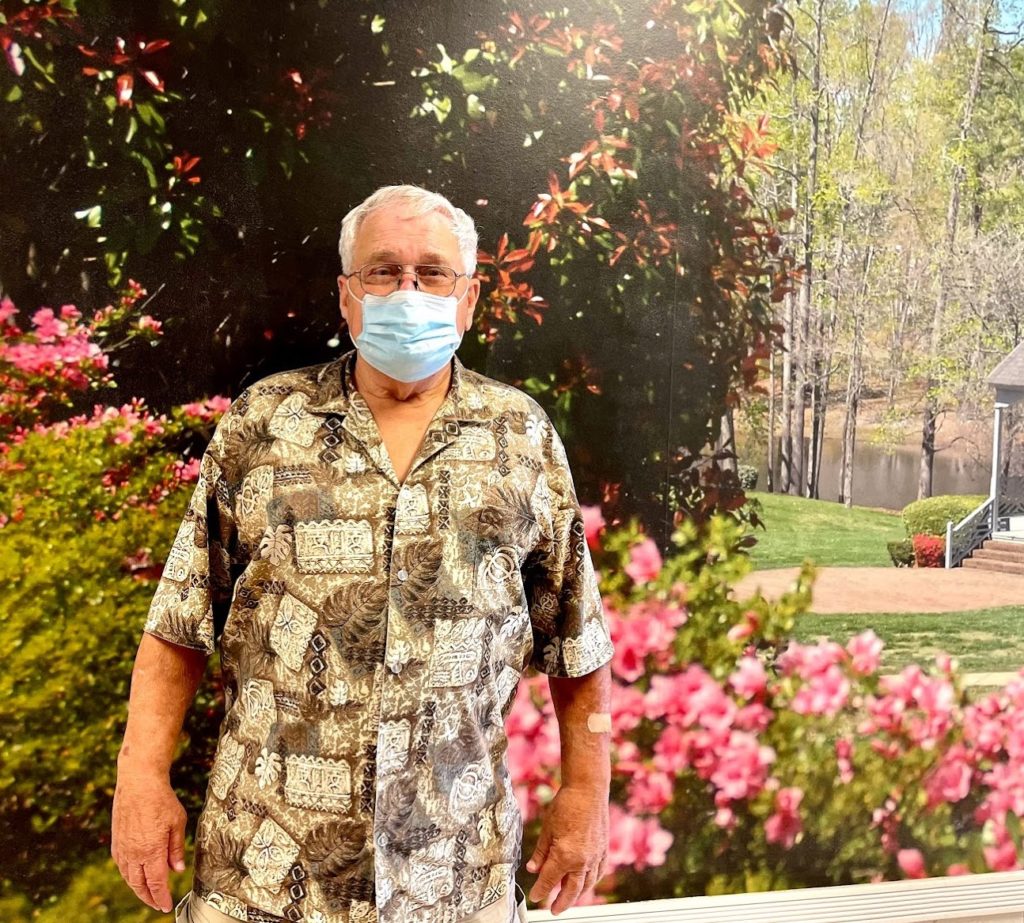
Danny Williford
After high school, Danny Williford was a helicopter mechanic during the Vietnam War. When he left the military, Williford pursued a degree in ornamental and horticulture crop technology. After two states and a series of jobs, Williford moved to Oxford, North Carolina where he operated an Exxon store for over 20 years.
At the same time, Williford built a nursery and florist business. He eventually worked at the nursery and florist full-time, but rising healthcare premiums as a small business owner became too much of a financial burden.
Williford decided to attend Vance-Granville where he earned an LPN (licensed practical nurse) credential. He worked for the hospital system as an LPN until his wife’s cancer diagnosis in 2014. His wife needed a full-time caregiver, so Williford retired.
With his wife on the mend, Williford returned to school in 2018 to pursue an RN degree. It was his wife’s cancer diagnosis that made him take the leap.
But he hit a few bumps in the road, including classes that pulled down his GPA, which in turn impacted his ability to stay in the RN program.
And that is why Williford is back at Vance-Granville taking classes to help boost his GPA.
“Vance-Granville has been a blessing just sitting right here,” Williford said. “It’s an undersold asset.”
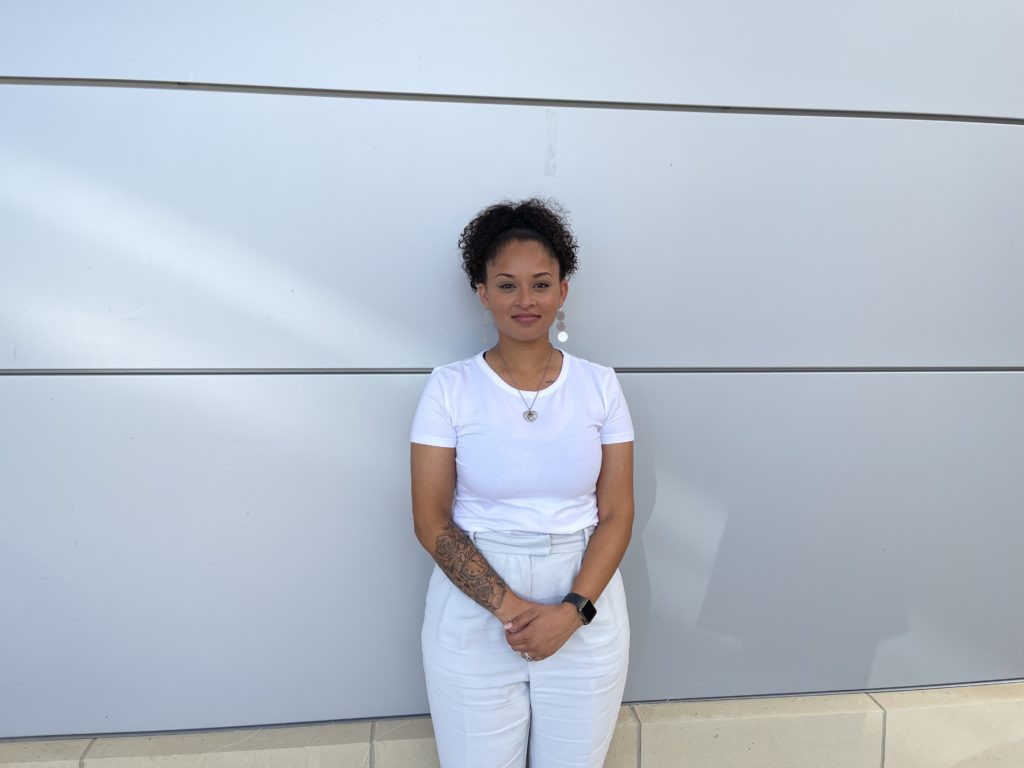
Brianna Allen
For Brianna Allen, the decision to return to school came after the death of her father.
“I want to be a helper,” Allen said. “And Blue Ridge Community College is the perfect starting place.”
Allen enrolled in the human services technology program at Blue Ridge after receiving a text message encouraging her to apply.
“A text message in this day and age is quite wonderful because I work all day Monday-Friday,” she said.
After applying, Allen was contacted within 24 hours and got the ball rolling. Now, she is in her third semester at Blue Ridge and is the current Student Government Association president.
Even though her father’s death pushed her forward, she said there is always some fear and apprehension about returning to school as an adult. Questions come up like, “Am I going to do well? Am I smart enough?”
But you can’t let fear run your life, Allen said.
“It took me six years to get back into school. I was a high school dropout,” she said.
When asked what advice she had for adults who were deciding whether they should return to school, Allen said, “Just do it.”
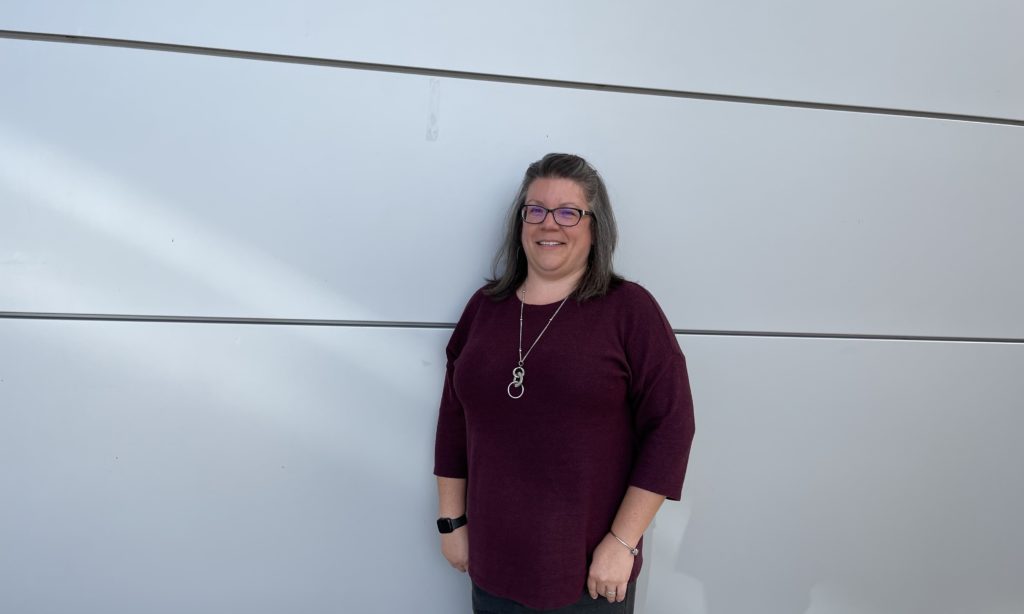
Jessica Reigle
Sometimes all you need is a sign. And that’s exactly what Jessica Reigle got – a light up sign on the side of the road about a Quickbooks class being offered by Blue Ridge Community College.
Reigle had stepped out of the workforce to take care of her children. When it was time for her to return, she realized her education no longer met the demands of the workforce she was trying to enter.
“My education was not as awesome as it was the first time around,” Reigle said.
When Reigle called about the class, the person on the other end told her about other options that were available. She is now in the accounting and finance program and plans to transfer to Fayetteville State University.
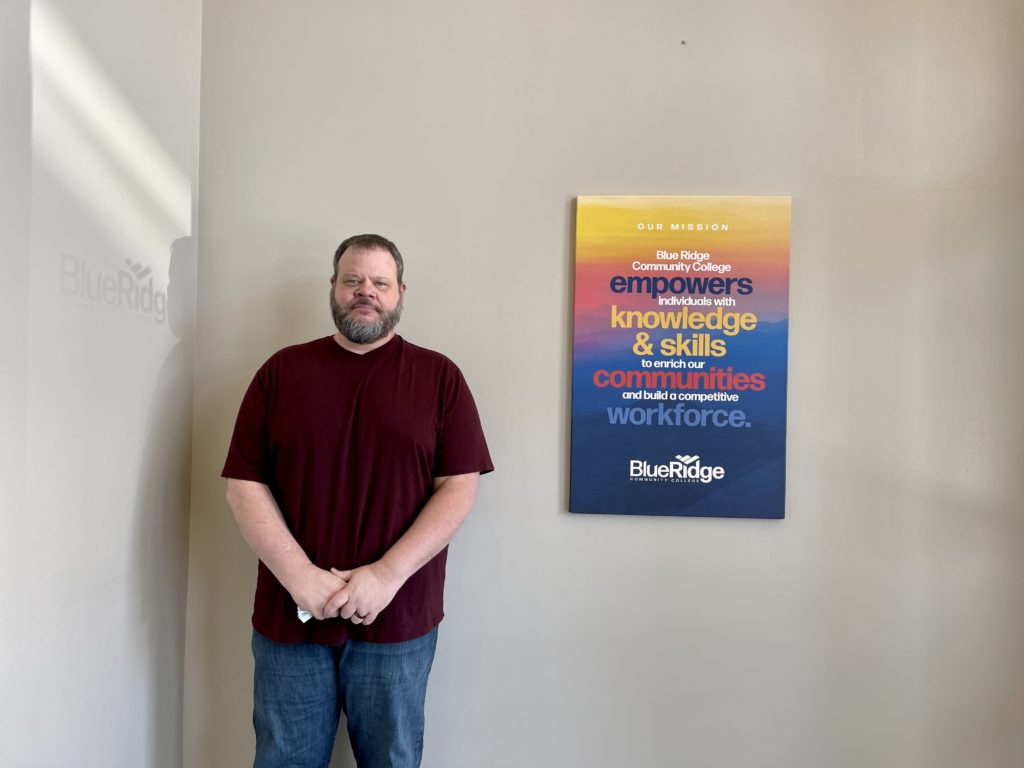
Eric Voncannon
Eric Voncannon wasn’t happy with his career and wanted to make a change. But when COVID hit, he had trouble finding a new job. It was during that time that he started doing a lot of self-reflection and knew going back to college was the right decision. That’s when he applied to Blue Ridge’s information technology program.
Voncannon is part of the “some college, no degree” population. He had been to college before, but something always happened, eventually forcing him to leave without finishing his degree.
According to a 2019 study, 36 million Americans fall into the same category as Voncannon. In North Carolina, 380,000 adults aged 25-44 fall into that category.
Both Voncannon and Reigle talked about what it was like returning to school as an older adult.
For Voncannon, the flexibility with online classes has been crucial to his success.
“There is no way I could come to class every day,” he said.
Reigle said ACA, the college transfer success course, really helped her.
“It ensured, as an online student, that I touched all the different pieces of what was going on here on campus,” she said. “I didn’t have that the first time I was in school.”
While Reigle and Voncannon both described hesitancy to return to school, they expressed gratitude and said the decision to pursue a credential was a good one.
“Remember, you can always find a reason not to do something,” said Voncannon.
A look ahead
Adult learners represent 40% of the student population in higher education nationwide. And while they enter college with varying degrees of challenges, they also bring with them experiences that can enrich a college campus.
The next article in our adult learner series will look at how the five pilot schools are making changes to their campuses to meet the growing needs of the adult learner population.
Editor’s note: The John M Belk Endowment supports the work of EducationNC



